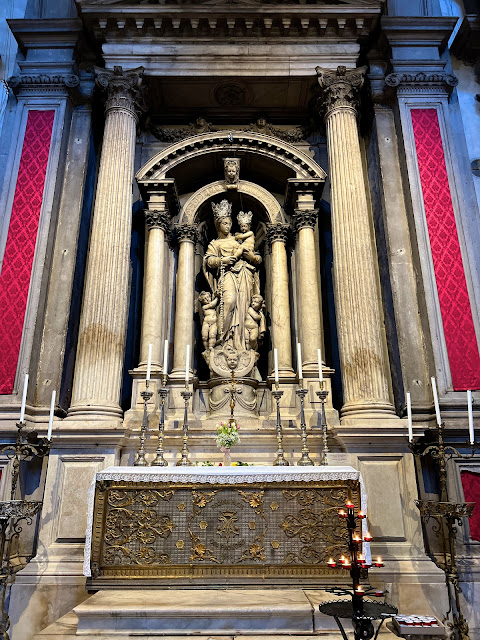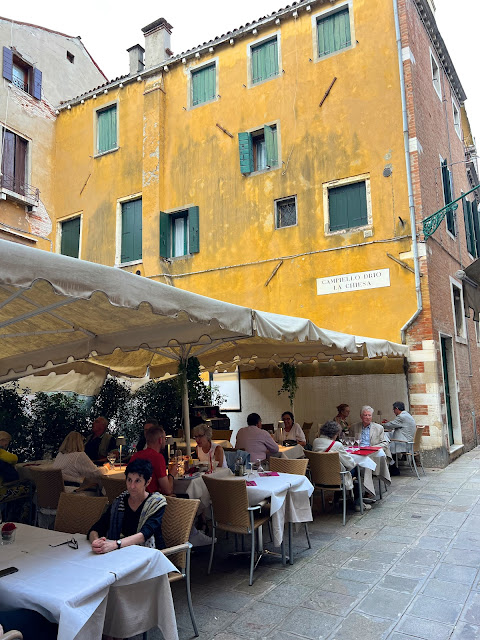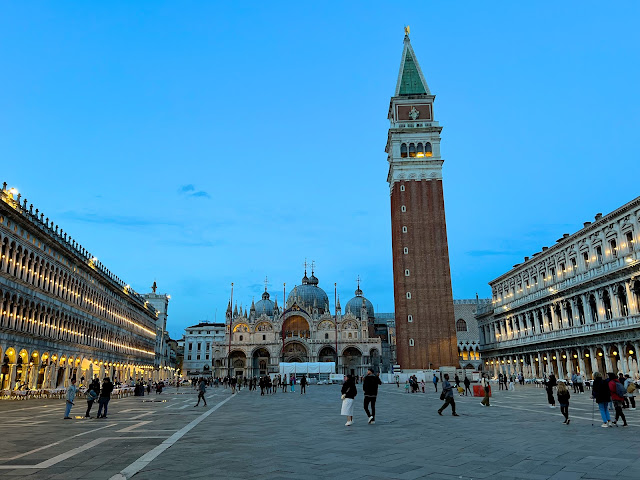We started our second day in Venice, of course, with breakfast. Kathi had read about a good place to get cappuccino and a cornetto. With our coffee jones in full effect, we bypassed the little shop just steps from our front door, and made the short trip to cafe Rosa Salva.
Venice is uniquely characterized by its narrow canals. In the early morning, all sorts of commercial and municipal service boat traffic was squeezing through its narrow passageways to begin the work day.
This morning, we were leaving the San Marco district to explore San Polo. First we had to cross the Rialto Bridge - the early morning light casting a shadow over the Rialto ferry station and bathing the Riva del Vin in sunlight.
Wandering our way through the maze of alleys in San Polo, we paused in the Campo San Polo to watch the dogs and kids playing, and think of our own sweet, chocolate lab, Lucca.
In the southwest corner of the campo lies the Chiesa di San Polo. The church, dedicated to the apostle Paul, was founded in 837 by the doges Pietro Tradonico and Orso Partecipazio and rebuilt in the 12th and 15th centuries.
Continuing to explore, we came across this little piece of street art, just before crossing the Ponte di San Polo. It needs no explanation.
Crossing the Rio dei Frari canal, we came to the Basilica di Santa Maria Gloriosa dei Frari. There seems to have been a community of Conventual Franciscans in Venice by 1225, and in 1234 Giovanni Badoer gave the friars (or Frari) some marshy land to build a church. The original smaller structure was replaced in 1442 - after 102 years of constuction!
This morning, we were leaving the San Marco district to explore San Polo. First we had to cross the Rialto Bridge - the early morning light casting a shadow over the Rialto ferry station and bathing the Riva del Vin in sunlight.
Wandering our way through the maze of alleys in San Polo, we paused in the Campo San Polo to watch the dogs and kids playing, and think of our own sweet, chocolate lab, Lucca.
In the southwest corner of the campo lies the Chiesa di San Polo. The church, dedicated to the apostle Paul, was founded in 837 by the doges Pietro Tradonico and Orso Partecipazio and rebuilt in the 12th and 15th centuries.
Continuing to explore, we came across this little piece of street art, just before crossing the Ponte di San Polo. It needs no explanation.
Crossing the Rio dei Frari canal, we came to the Basilica di Santa Maria Gloriosa dei Frari. There seems to have been a community of Conventual Franciscans in Venice by 1225, and in 1234 Giovanni Badoer gave the friars (or Frari) some marshy land to build a church. The original smaller structure was replaced in 1442 - after 102 years of constuction!
Over the arch of the doorway is a 1581 Risen Christ by Alessandro Vittoria, flanked lower down by The Virgin and Saint Francis by Bartolomeo Bon in the 15th century.
Inside, the twelve huge round pillars between the nave and the aisles represent the apostles; the tie-beams are there for stability in a sinking city.
Palma Giovane's 1595 Martyrdom of Saint Catherine, that sits over an altar, was deemed unsatisfactory by the friars because of the violence it portrays, but they eventually came around and let it stay.
The ornate confessionals almost makes you want to give up your sins.
In the Sacristy is Bellini's Madonna con bambino e santi Below it is Cabianca's 1711 reliquary altar. In its center is the relic of Mary Magdalene's oil mixed with Jesus's blood collected under the cross.
Dominating the centre of the church, is a choir area for the friars, spearating the nave of the lay congregation by a carved marble screen built in 1475. The dark wood of the monumental monks’ choir (a rare survival in Venice) was erected in 1468. The 124 choir stalls feature fine carving and intarsia by Marco Cozzi, depicting views of an ‘ideal city’.
Kathi and I were both touched by this divotional statue of the Virgin Mary, where patrons ahd left photos of loved ones to accompany their prayers.
The ornate confessionals almost makes you want to give up your sins.
In the Sacristy is Bellini's Madonna con bambino e santi Below it is Cabianca's 1711 reliquary altar. In its center is the relic of Mary Magdalene's oil mixed with Jesus's blood collected under the cross.
Just steps off the sacristy is the sala del Capitolo (Chaper House) including the tomb of Doge Francesco Dandolo, with a Paolo Veneziano lunette panel of the Virgin and Child, with Saints Francis and Elizabeth of Portugal (or Hungary) and Doge Francesco Dandolo and his wife from 1339.
Looking out into the courtyard and the capped fresh water well...
Titian’s Assumption (of the Virgin), over the main altar, sits in an enormous limestone frame and is said to be the largest altarpiece in Venice.
Looking out into the courtyard and the capped fresh water well...
Titian’s Assumption (of the Virgin), over the main altar, sits in an enormous limestone frame and is said to be the largest altarpiece in Venice.
The ornate frame is topped by a sculpted Risen Christ flanked by the figures of Saints Francis and Anthony of Padua all life-sized.
In a side chapel. lies the Saint Mark Triptych...
We flanked the back side the Bascilica's presbytery along this lovely little tree-lined courtyard.... and beautifully decorative fencing...
Dead ahead was the eye-catching Chiesa di San Rocco - Catholic church founded in 1508, with a baroque, 18th-century facade and paintings by Tintoretto.
Transitioning from the heavenly to the banal, I'm always drawn to the graphic arts; in this case the Italians co-opting the Flintstones for a band poster.
After a quick interlude, back to the heavenly - a lovely religious monument tucked into a street corner.
Pretty alleys leading to private gardens and tony residences...
Continuing west through San Polo, we reached the Giardini Papadopoli, on the banks of the Rio Novo. It was a nice spot to take a break in the shade of the treesAcross the Rio Novo was a bustling commercial district with a Sephora, KFC (gross) and a Nike store - all hiding the train station behind it.
We had come to the end of San Polo and were now starting to circle back towards San Marco. Along the canal, we had a ringside seat to observe how the local merchants get rid of trash. Canal barges, with mounted cranes, lift trash bins onto the vessel, dump its contents, and then returns the bins to the street where they can be wheeled back intoi the merchant's collection area. Inginuity!
More street art...
From simple stick figures... to more lifelike features with penetrating eyes...
Heading northeast, we crossed the Ponte del Cristo and were treated to this canal view of the Rio Marin.
Continuing our circumnavigation of San Polo, near the
Thought to have been founded in the 9th or 10th century, it is nevertheless among the oldest churches in Venice and is one of the starting points of pilgrimages to Santiago de Campostella, as evidenced by the image of a pilgrim carrying a shell on the bell tower.
One of the things we are always drawn to are the neighborhood produce markets that pop up throughout the cities of Europe.
In freshness, diversity, and emphasis on healthy foods, they are a far cry from the neighborhood 7-11...
On the Rio del Magio looking towards the Calle del Tentor...
Crossing the Calle Colombo footbridge across the Rio del Magio, potted flowers for beauty, hanging laundry for utility...
Crossing the Ponte delle Tette, its a wonder that boats can traverse these narrow waterways. Makes me wonder if there's a general acceptance of a maximum beam width.
Next to All'Arco was this shop promoting the sale of baccala, the celebrated, salted cod originating from Scandanavia (Norway, Denmark, Iceland). You can see how baccala is served in the top left of the photo above.Baccala was not to our liking, but perhaps it is an acquired taste.
Transitioning from the heavenly to the banal, I'm always drawn to the graphic arts; in this case the Italians co-opting the Flintstones for a band poster.
After a quick interlude, back to the heavenly - a lovely religious monument tucked into a street corner.
Pretty alleys leading to private gardens and tony residences...
Many find Venice too crowded, at the big tourist spots are, but exploring the city beyond these crush points, the intimate canals will win you over.
With the bombing of Gaza, like in the US, evidence of solidarity with the people of Palestine was ubiquitous.Continuing west through San Polo, we reached the Giardini Papadopoli, on the banks of the Rio Novo. It was a nice spot to take a break in the shade of the treesAcross the Rio Novo was a bustling commercial district with a Sephora, KFC (gross) and a Nike store - all hiding the train station behind it.
We had come to the end of San Polo and were now starting to circle back towards San Marco. Along the canal, we had a ringside seat to observe how the local merchants get rid of trash. Canal barges, with mounted cranes, lift trash bins onto the vessel, dump its contents, and then returns the bins to the street where they can be wheeled back intoi the merchant's collection area. Inginuity!
More street art...
From simple stick figures... to more lifelike features with penetrating eyes...
Heading northeast, we crossed the Ponte del Cristo and were treated to this canal view of the Rio Marin.
Continuing our circumnavigation of San Polo, near the
Campiello de le Strope, open doors allowed us views into this woodworking shop.
We made our way to the Campo San Giacomo, where we found the Chiesa Parrocchiale di San Giacomo dall'Orio, with its bell tower and inviting, south-facing, sun-filled square.Urban trees provided shade and respite for the eyes, body, and mind.Thought to have been founded in the 9th or 10th century, it is nevertheless among the oldest churches in Venice and is one of the starting points of pilgrimages to Santiago de Campostella, as evidenced by the image of a pilgrim carrying a shell on the bell tower.
One of the things we are always drawn to are the neighborhood produce markets that pop up throughout the cities of Europe.
In freshness, diversity, and emphasis on healthy foods, they are a far cry from the neighborhood 7-11...
On the Rio del Magio looking towards the Calle del Tentor...
Crossing the Calle Colombo footbridge across the Rio del Magio, potted flowers for beauty, hanging laundry for utility...
Crossing the Ponte delle Tette, its a wonder that boats can traverse these narrow waterways. Makes me wonder if there's a general acceptance of a maximum beam width.
For lunch, we hunted down All'Arco ("to the arch"), the spot popularized by Stanley Tucci's TV program Searching For Italy for its beautiful and tastey cicchetti - small plates of food meant as a quick, light meal.
The waiting line was, perhaps, evidence of Stanley's influence. It's funny, I just listened to a podcast by Rick Steves on his thoughts about travel to Europe and he talked about the contradiction about travel writers publicizing places to go and then travelers having a poorer "authentic" experience when they get there. He encouraged travelers to not avoid these recommendations, but only as a foundation for understanding and then a springboard to explore and seek out similar untrammeled places and experiences. I think that's what we try to do with our travel, but I digress..
Inside All'Arco, (otherwise, the neighborhood bar) customers perused the glass cases and examples of the varieties of cicchetti.
Kathi emerged with her choices.
You can see why these treats are beloved by Veneziani and tourists alike and why All'Arco is so popular. The bite-size morsels are artfully arranged and delicious.Next to All'Arco was this shop promoting the sale of baccala, the celebrated, salted cod originating from Scandanavia (Norway, Denmark, Iceland). You can see how baccala is served in the top left of the photo above.Baccala was not to our liking, but perhaps it is an acquired taste.
Later in the trip, we would travel to Bologna, known for its arched passageways. So I was mindful, even in Venice to look up for inspiration. These lovely painted arches are across the Ruga dei Spezieri, near the Rialto Mercato.
Crossing back across the Rialto bridge, and then the rio della Fava, we stopped at the Chiesa di Santa Maria della Fava, an ancient Roman Catholic church finished around 1500. The interior of the church has a famous altarpiece of Saint Anne, Young Mary, and Saint Gioacchino, (1732) by Tiepolo. The main alter with its geometric, tiled floor was stunning!
Side alters were no less impressive.
Back on the street, anywhere near the tourist magnet of the Rialto bridge, you find these warnings. Attenzione! Beware of pickpockets!
More interesting street art...
Back in San Marco, it was getting near our American dinner time so this outdoor dining area near the Campo San Fantin looked really inviting!
In contrast to the hyper-commercialized, chain bookstores in the U.S., we love these Italian alternatives, tucked into the nooks and crannies of the Venetian streets.
Continuing on, we made our way to the Campo Sant'Angelo, with the
Crossing back across the Rialto bridge, and then the rio della Fava, we stopped at the Chiesa di Santa Maria della Fava, an ancient Roman Catholic church finished around 1500. The interior of the church has a famous altarpiece of Saint Anne, Young Mary, and Saint Gioacchino, (1732) by Tiepolo. The main alter with its geometric, tiled floor was stunning!
Side alters were no less impressive.
Back on the street, anywhere near the tourist magnet of the Rialto bridge, you find these warnings. Attenzione! Beware of pickpockets!
More interesting street art...
Back in San Marco, it was getting near our American dinner time so this outdoor dining area near the Campo San Fantin looked really inviting!
In contrast to the hyper-commercialized, chain bookstores in the U.S., we love these Italian alternatives, tucked into the nooks and crannies of the Venetian streets.
On our way to the Campo Sant'Angelo, we stopped for apertivo to buoy us before a late Italian dinner.
Happy to be in Italy, even with rain threatening...Continuing on, we made our way to the Campo Sant'Angelo, with the
Campanile di Santo Stefano looming in a background of alternating sun and storm clouds.
In the Campo Santo Stefano, a lovely flower merchant strategically displayed her wares to draw customers in.At the Ponte dell'Accademia, we stopped and looked to the east to admire the Grand Canal and the Basilica Santa Maria della Salute in the Dorsoduro neighborhood.We retraced our steps to the Campo Santo Stefano, anchored by a statue of Italian linguist, journalist & essayist Niccolò Tommaseo and the Chiesa di Santo Stefano.
After all the day's roaming, it was finally time to eat!
We chose the outdoor seating offered by the Beccafico Guna Restaurant and were not disappointed!
I had the ravioli alla ricotta e spinaci and Kathi had the millerighe alla norma ("thousand lines" pasta with tomato sauce, aubergine and ricotta). A work of art...
Strolling home, we connected with the Campo San Fantin and admired this intimate setting for a meal, coffee, or a drink - you'll find nothing like this in the U.S. unfortunately.
Street art in my imagination; can you see the mustached grimace in this apartment call box?
Crossing the Ponte dei Barcaroli and dreaming what it would be like to live the beautiful canal life...

































































